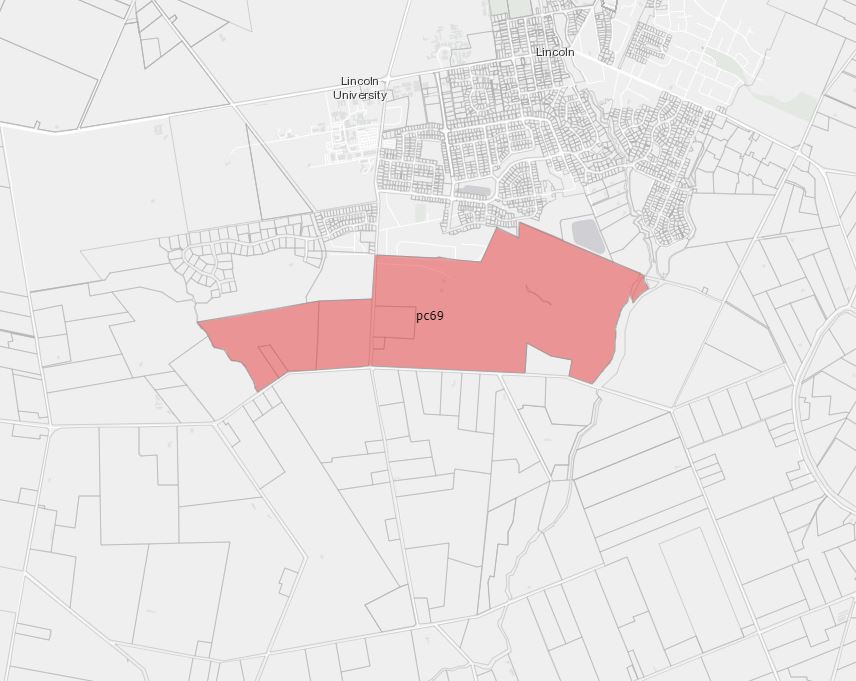
The applicant, Carter Group, is seeking to rezone rural land, which would enable 2000 residential sections.
The Selwyn District Council is in the process of summarising the 255 submissions received on Plan Change 69.
Next month it plans to release the summary, which will show the numbers opposing and supporting the change, before notifying the period for further submissions.
In the meantime, the Selwyn Times has taken a snapshot of residents’ concerns and comments by looking at a handful of submissions.
John and Leslie Greenslade, who own the bulk of the land that has been earmarked for development and with whom Carter Group have a purchase agreement, supported the plan change.
The couple, who plan to keep the Springs Homestead where they raised their four children, said they are already being encroached by housing from the Te Whariki and Verdeco subdivisions.
"We have already had a few complaints about the noise from general farm machinery such as irrigators, tractors and motorbikes which we feel will only increase as the houses get closer.
"The noise from stock is also underestimated by people unused to country life, whether it is simply bringing in the cows for milking at 4.30 in the morning, weaning calves or shifting other stock, the noise taken for granted by us is not always viewed the same way by other people.”
They believed the large natural springs they had fenced off and protected in the area would be enhanced with the development, so the whole community could enjoy them.
Similarly Mark Leggett, of Broadfield Estates Ltd in Lincoln, supported the intent of the plan change. He said it would address a shortfall of residential land.
However, he objected to the proposed road on the planning maps connecting to Liffey Springs Dr.
"The new subdivision would be provided with sufficient permeability and connectivity in north-south directions through the proposed connections to Springs and Ellesmere Rds and Southfield Drive and from Verdeco Boulevard, without also creating a further connection to Liffey Springs Drive.
"Further, the imposition of a road over the Liffey Springs Reserve would compromise the attractive, low-key amenity and character of that reserve."
Lincoln University adopted a neutral position in its submission, but strongly opposed any reliance on or construction of a potential bypass road.
"Any bypass adjacent to the university would result in unacceptable traffic effects.
"The university has understood for some time that the Selwyn District Council is no longer pursuing the bypass and the university supports the council’s position on this."
The Ministry of Education did not submit in support or opposition, but said the plan change should only proceed if a number of issues were addressed.
Consultant Hugh Loughnan said these included that the applicant consulted with the ministry to ensure adequate provision for additional school age children, which could include planning for a new school site.
"The ministry estimates that the addition of 2000 households is likely to put significant pressure on the rolls of Ararira Springs Primary-Te Puna o Ararira, Lincoln High School and Lincoln Primary School," Loughnan said.

She said the land has a land-use capability of class one to three, meaning it is highly productive.
"Access to highly productive land is essential to continue food production for the domestic market and for export.
"Globally, the demand for dairy products is growing and the demand for horticultural and cropping products like kiwifruit remains high.
"In 2019, New Zealand’s land-based primary industries generated $44 billion in export revenue. The Government has set a target for the primary industries to increase export earnings by a further $44 billion in the next decade to support economic recovery after the Covid-19 pandemic."

This would be better than "villages spreading out and destroying the surrounding wilderness".
He encouraged the district council to instead allow urbanisation on poorer soils between Rolleston and West Melton, where shops and roading was already present.
"I plead with Selwyn District Council to protect the remaining highly productive land resource within Selwyn District for future generations.
"Stop developers from using and destroying forever the good soil and fertile lands around Prebbleton, Lincoln, Tai Tapu, Springston."
Scott Loeffler, of Lincoln, was also in opposition. Among his reasons was the insufficient sports fields, parks, roading and sewage infrastructure.
"By rapid growth without infrastructure, the reason that people live in Lincoln will be decimated.
"Not only will there be too few facilities for the population, but the character of the township will be changed to a gas-guzzling satellite of Christchurch with no character.
"The amount of green space must be shared by more people and UK research has shown a strong correlation with the amount of available urban greenspace and children’s health up to 24 years of age."

"Part of our purchase decision in Lincoln was the size of the town and the constraints on boundary change by the rural zoning around."
Janine Sidery, of Lincoln, was also in opposition, citing a range of concerns including about traffic.
"Lincoln is not a suburb of Christchurch. Traffic is already a serious issue in Lincoln. Ellesmere, Birchs Rd, Springs Rd and Edwards/Gerald are becoming traffic intense.
"Adding 6000 more residents than planned for will add to this burden."
Lincoln Envirotown also opposed the plan change.
"This ‘business as usual’ proposal to use a vast area of such land in this way is very short-sighted.
"It is generally accepted that these large sprawling dormitory living areas risk losing any feeling of community and sense of belonging which we see as detrimental to the enjoyment and well being of Selwyn’s residents."
- The full list of submissions is available here.













